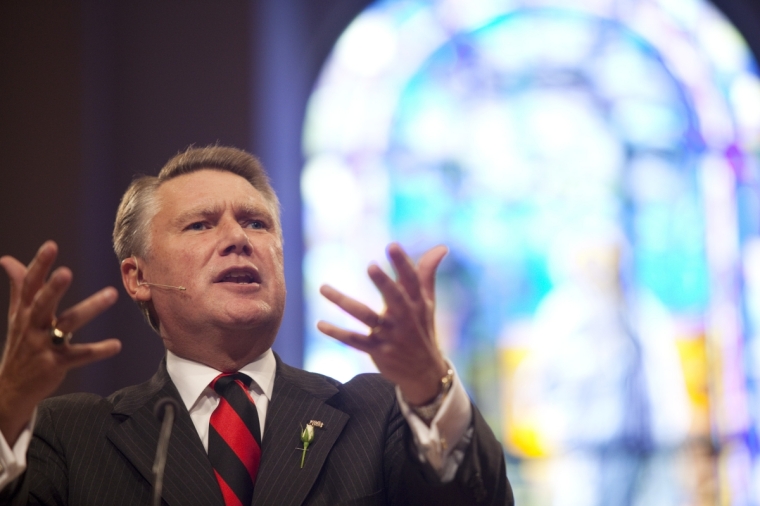Survey: FEW clergy speak on candidates by name, but do discuss political issues in pulpit

PRINCETON, N.J. (Christian Examiner) – A new survey from the Pew Research Center concludes that America's pastors speak often about hot-button political issues from the pulpit, but few speak directly about political candidates like Hillary Clinton or Donald Trump.
The survey, which was published Aug. 8, ironically comes just weeks after GOP presidential candidate Donald Trump promised in his nomination acceptance speech before the Republican National Convention to repeal the Johnson Amendment in the 1954 Revenue Code, which prohibits pastors from engaging in the public endorsement of candidates from the pulpit.
"At this moment, I would like to thank the evangelical and religious community in general who have been so good to me and so supportive. You have much to contribute to our politics, yet our laws prevent you from speaking your minds from your own pulpits," Trump told the Convention.
"An amendment, pushed by Lyndon Johnson, many years ago, threatens religious institutions with a loss of their tax-exempt status if they openly advocate their political views. I am going to work very hard to repeal that language and protect free speech for all Americans."
In the survey, which examined the religious opinions of more than 4,600 adults for a month-week period from June 5-July 7, 40 percent of Americans said they had attended church at least twice in the months before the poll was taken. Among that group, 64 percent said they heard ministers in their congregations speak on at least one of six social and political topics in a church service.
Those topics included religious liberty, homosexuality, abortion, immigration, environmental issues and economic equality. Religious liberty garnered the most attention with 40 percent claiming they had hear their clergy discuss it from the pulpit. Homosexuality was a close second, at 39 percent. Abortion – legalized for more than 40 years in the U.S. – still merited significant attention at 29 percent.
Nearly half, however, claimed that their clergy rarely if ever spoke on political issues from the pulpit. Only 14 percent said their ministers had spoken about a specific candidate and, when that occurred, it was more likely to be done among black Protestant congregations.
Nearly one-third (29 percent) of black Protestant church goers told surveyors that they had heard their clergy specifically address support for Democrat candidate Hillary Clinton over the month-long survey period. Only two percent of black Protestant clergy were favorable toward Trump, but as many as 20 percent of black Protestant clergy spoke against him. Only seven percent of the same group spoke against Clinton.
Black Protestant clergy were also more likely to encourage their parishioners to vote in the November elections. Six-in-ten (59 percent) said they heard a minister encourage voter turnout for the presidential election. That number was significantly lower among white Evangelicals (47 percent), white mainline Protestants (27 percent) and Catholics (34 percent).
In spite of the high numbers of black Protestants who hear stumping for Democrat candidates from the pulpit, most of what American churchgoers hear from the pulpit is conservative, the survey claims. But that doesn't mean most of the denominations vote in conservative fashion.
While mostly white evangelical denominations, such as the Southern Baptist Convention, Assemblies of God and Church of the Nazarene, tend to be Republican-oriented, many mainline denominations are generally more liberal and, therefore, oriented toward Democrats. Historically black denominations, such as the National Baptist Convention and African Methodist Episcopal Church, tend to vote Democrat by wide margins (87 and 92 percent, respectively).
Like Trump, the Republican platform calls for the elimination of the Johnson Amendment, which has generally been regarded by historians as a type of revenge amendment. It was added to the revenue code after Johnson was opposed for his re-election to the U.S. Senate by members of conservative churches and anti-communist leagues in Texas. Those groups were operating as religious or non-profit organizations with tax-exempt status.
Opponents of church's taking stands on political candidates seem to believe that should the provision be lifted, churches will become well-funded Super PACs (political action committees) for conservative candidates.
"If the Johnson Amendment were repealed, pastors would be able to endorse candidates from the pulpit, which they're currently not allowed to do by law. But it's also true that a lot more money could possibly flow into politics via donations to churches and other religious organizations. That could mean religious groups would become much more powerful political forces in American politics—and it would almost certainly tee up future court battles," Emma Green, a senior associate editor with The Atlantic, wrote.
However, even before the Johnson Amendment was passed in 1954, there was no widespread church involvement in U.S. elections. The churches of America very infrequently endorsed candidates for office and few, if any, put their voices and wallets behind political races, with the exception of the 1928 presidential election.
Then, many Protestant ministers and churches advocated in the pulpit and in print against the election of Democrat Al Smith, who would have been the first Roman Catholic president of the United States.
To a lesser degree, some Protestant churches did the same during the 1960 presidential election – until Sen. John F. Kennedy openly said he would not impose his Catholic views on the presidency and that he, and 40 million other Catholics at the time, should have the same opportunity to run for president as any Protestant American.
Alliance Defending Freedom and the Evangelical Council for Financial Accountability (EFCA) advocate changing the Johnson Amendment to clarify what churches can and cannot do during the election season.
Both propose that political speech from the pulpit, which results in no additional or minimal cost to the organization, should be protected. They also claim that if the speech costs more than a minimal amount, then "the Johnson Amendment would only prohibit speech that clearly identifies candidates and directly calls for those candidates' election or defeat."